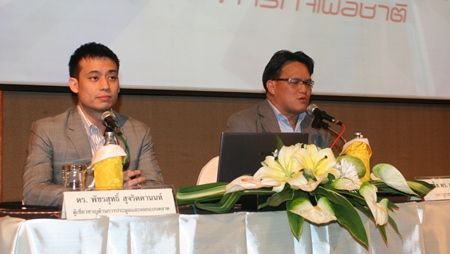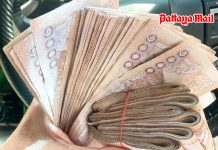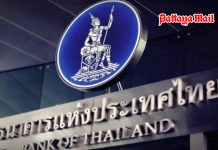While major Western and Asian nations are mass-marketing super-fast, fourth-generation mobile data networks, Thailand is still figuring out how to auction off 3G frequencies to cover the kingdom.
The National Broadcasting and Telecommunications Commission held another in a series of public hearings in Pattaya Sept. 7 to review its latest tinkering with the rules of a long-delayed 3G auction. Postponed by more than two years by lawsuits and government infighting, the auction finally is set to take place Oct. 17.
A 45-megahertz chunk of Thailand’s 2.1-gigahertz frequency will be sold off in 5 Mhz slices with a minimum bid price of 4.5 billion baht.
 Dr. Phatcharasut Sujarittanont (left) and Pol. Lt. Jetsada Sewarak (right), secretary to the vice president of NBTC, address another in a series of public hearings to review the rules of a long-delayed 3G auction.
Dr. Phatcharasut Sujarittanont (left) and Pol. Lt. Jetsada Sewarak (right), secretary to the vice president of NBTC, address another in a series of public hearings to review the rules of a long-delayed 3G auction.
A last-minute change in the rules by the NBTC, explained at the Sept. 7 hearing at the Amari Orchid Resort Pattaya, likely has made the auction a moot point, however. Most industry analysts expect each chunk of bandwidth to go for only the minimum bid to three domestic providers, as an agency-backed law prohibits any foreign telecom operators from participating.
In mid-August, the NBTC pushed through a rule change that lowered the maximum amount of bandwidth any one bidder could purchase from 20 Mhz to 15 Mhz. Advanced Info Service Plc and Total Access Communications Pcl (DTAC) were expected to buy 20 Mhz each, leaving smaller True Corp. with only 5 Mhz.
With the change, AIS and DTAC will now be capped at 15 Mhz, leaving the last 15 Mhz for True.
Agency auction-design and marketing official Phatcharasut Sujarittanont nonetheless called the auction “clean and just,” saying the manipulation of the frequency was made to have “the most benefit” to the country.
“The auction for 3G frequency is beneficial to citizens since we will have more options in choosing signal frequencies for better information transmittal,” he said. “Once the auction is completed, citizens will have an increase in channels and speed.”
Thailand ranks last in the Asia-Pacific region to deploy 3G mobile data services, despite being one of the first to propose it 10 years ago. But unwillingness by government-owned telecom operators to share valuable frequency and a 2010 Supreme Court decision to prohibit a planned auction has made Thailand an also-ran in Asia’s high-tech industry.
Countries from Singapore to Japan are now marketing fast 4G Long-Term Evolution services while Thailand has yet to deploy 3G outside major cities. Industry analysts say AIS, DTAC and True could, however, use a third of the maximum 15 Mhz they can buy next month for LTE.




